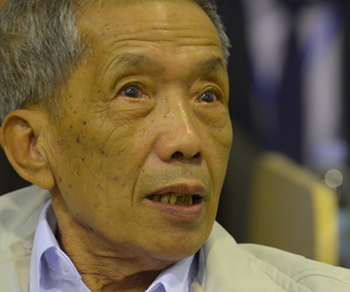
Comrade Duch at the February 3 tribunal hearing in Phnom Penh. (Courtesy ECCC)
PHNOM PENH, Cambodia, and NEW DELHI – A court in Cambodia on Friday rejected an appeal by a notorious Khmer Rouge jailer and extended his prison sentence to life in a decision welcomed by many in the war-torn country.
Kang Kek Ieu, known as Kaing Guek Eav in tribunal filings but more often referred to as Comrade Duch, ran the Tuol Sleng “S-21” prison where more than 12,000 people were tortured and executed.
“The crimes by Kaing Guek Eav were undoubtedly among the worst in recorded human history,” Judge Kong Srim said as hundreds of survivors gathered outside the court. “They deserve the highest penalty available.”
Duch had filed an appeal last year over his 2010 conviction for crimes against humanity, arguing that he had been a junior official who was only following orders. The legal strategy backfired, however, when the appeals panel of the United Nations-backed war crimes court Friday increased his original 35-year sentence to life.
The gaunt former schoolteacher, 69, showed no emotion at the decision, pressing his hands in a gesture of respect toward the judges before leaving the courtroom.
Many inmates in S-21, a security hub for the regime, were slaughtered in a nearby orchard, part of a particularly brutal period in Cambodia’s history depicted in the 1984 film “The Killing Fields.”
Trials for the regime’s three most senior surviving leaders – ideologue Nuon Chea, former foreign minister Ieng Sary, and ex-head of state Khieu Samphan, all in their 80s – on genocide and crimes-against-humanity charges are ongoing amid concern they may not live long enough to face a verdict.
Pol Pot, the French-educated leader of the agrarian, anti-intellectual movement, died in a jungle camp in 1998 without publicly explaining the rationale for the killing spree, which was also an indictment of an international system that largely stood by as it happened.
Stephen Rapp, the U.S. ambassador-at-large for war crimes Issues, said the case against Duch advanced the cause of justice and reconciliation for Cambodia people.
It was also the first trial for crimes against humanity to be successfully completed since the brutal four-year period of Khmer Rouge rule in the late 1970s. An estimated 1.7 million people were executed or died of starvation, disease or overwork under the regime, analysts say.
“It’s an important step to show they can actually get one of these cases out of the way,” said Rupert Abbott, a researcher with human rights watchdog Amnesty International. “This has really been welcomed by the Cambodian people.”
Abbot criticized the court, however, for overturning a lower court judgment recognizing and chastizing the judicial system for Duch’s eight years spent in illegal detention. “That sent a positive message to Cambodia, where illegal pretrial detention is routine,” he said.
The trials have been controversial in Cambodia, where many former Khmer Rouge members serve in senior government positions, including Prime Minister Hun Sen, leading to wrangling over the court’s legitimacy and procedures.
Youk Chhang, director of the Documentation Center of Cambodia, which researches Khmer Rouge crimes, said the life sentence would “ease the fears” of many Khmer Rouge victims, but that it was only one stop on the long road toward reconciliation for this conflict-torn nation.
“This must be a reminder that we should come to a day when this cannot happen (again),” he said. WITH MARK MAGNIER
[Published in the Los Angeles Times, February 3, 2012]



